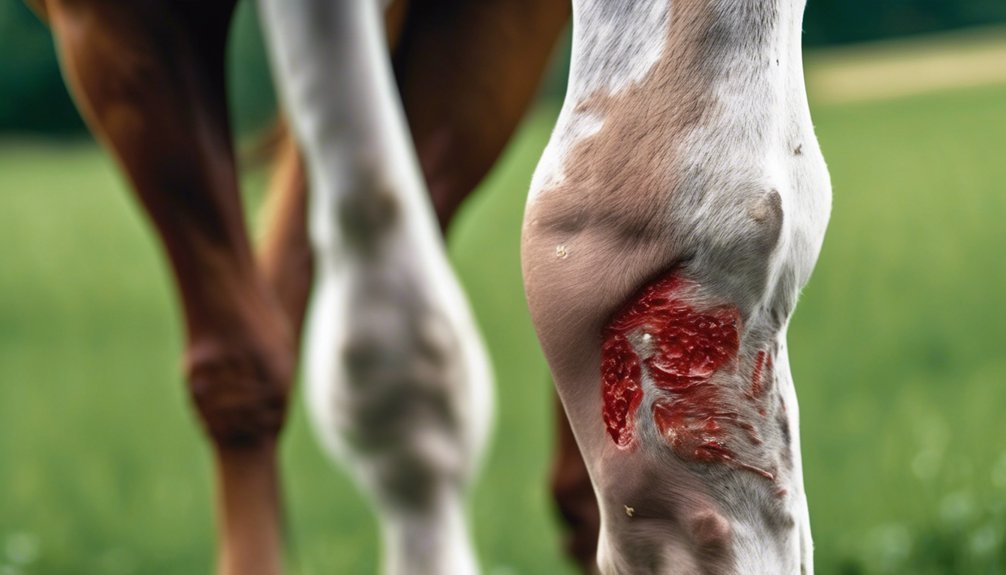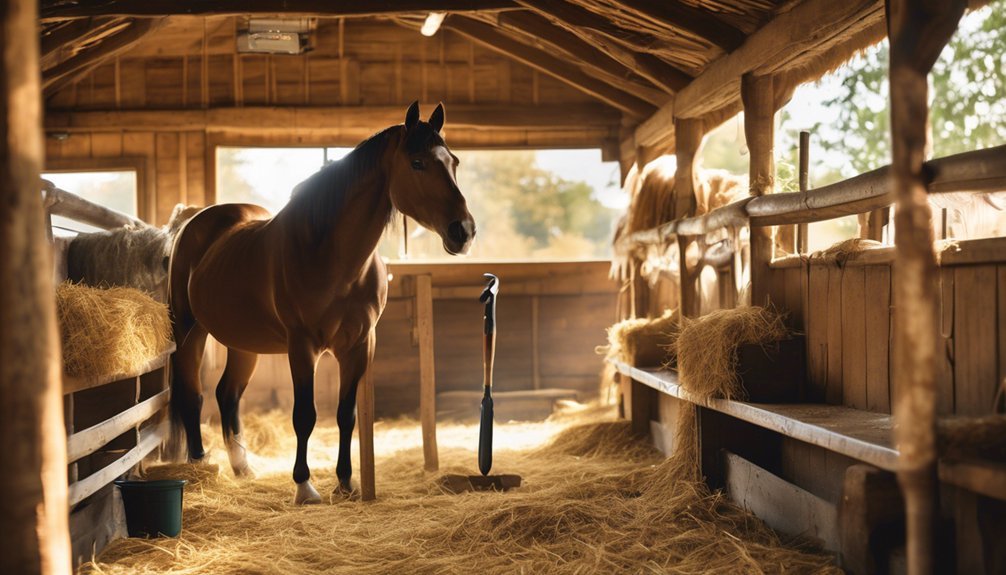
Preventing and treating horse fungus is essential for maintaining your horse's health. Fungi thrive in damp environments, making proper care and management crucial. By understanding the types of infections, recognizing symptoms, and implementing effective prevention strategies, you can significantly reduce the risk. You'll also need to be aware of the treatment options available. Discover how to keep your horse's skin healthy and vibrant, ensuring they stay fungus-free.
Key Takeaways
- Maintain clean, dry, and well-ventilated living conditions to minimize moisture and prevent fungal growth.
- Regularly groom horses to enhance skin health and circulation, reducing the risk of infections.
- Provide a balanced diet rich in vitamins and minerals to strengthen the horse's immune system.
- Monitor horses for signs of fungal infections, such as itching or hair loss, for early intervention.
- Use topical antifungal treatments as a first line of defense, and consult a veterinarian for severe cases.
Understanding Fungal Infections in Horses

When it comes to understanding fungal infections in horses, it's crucial to recognize that these organisms can thrive in various environments, especially in damp, warm conditions.
Fungi reproduce through a complex fungal life cycle, which includes spores that can easily spread and infect your horse. Your horse's immune response plays a vital role in combating these infections. A strong immune system can help limit the severity of an outbreak, while a weakened immune response leaves your horse vulnerable.
Regularly monitoring your horse's skin and overall health can help you catch any signs early. Maintaining a clean, dry environment is essential in preventing fungal growth and supporting your horse's natural defenses against these resilient organisms.
Common Types of Fungal Infections
Several common types of fungal infections can affect horses, each presenting unique challenges. One of the most recognizable is the ringworm infection, which manifests as circular patches of hair loss and can be quite contagious. This infection thrives in warm, humid environments, making prevention crucial.
Another concern is thrush fungus, primarily affecting the hooves and leading to painful conditions if left untreated. It typically occurs in wet or dirty environments, emphasizing the importance of maintaining clean, dry living conditions for your horse.
Signs and Symptoms of Horse Fungus

Recognizing the signs and symptoms of horse fungus is essential for early intervention and effective treatment.
One of the first things you might notice is itchy skin, which can lead your horse to rub or bite at the affected areas. This irritation often results in hair loss, creating patches that can be alarming.
You may also see redness or inflammation around these spots, indicating a potential fungal infection. Additionally, check for scaly or crusty lesions that might appear on the skin.
If you notice any of these symptoms, it's crucial to act quickly. Addressing the issue promptly can help prevent the infection from worsening and ensure your horse remains comfortable and healthy.
Pay close attention to these signs to keep your horse in top condition.
Risk Factors for Fungal Infections
Fungal infections in horses can thrive under specific conditions, making awareness of risk factors essential for prevention.
Here are some key elements to consider:
- High moisture levels in the environment
- Poor equine hygiene practices
- Overcrowded living conditions
When moisture levels are elevated, fungi have the perfect breeding ground.
It's crucial to maintain optimal hygiene, as neglecting grooming and cleaning can lead to skin issues.
Additionally, overcrowded stabling can increase stress, compromising your horse's immune system.
Prevention Strategies for Horse Owners

To effectively prevent fungal infections in horses, you need to implement a comprehensive strategy that addresses environmental factors and daily care routines.
Begin with proper grooming techniques; regular brushing not only removes dirt and debris but also enhances circulation, keeping your horse's skin healthy. Pay close attention to areas prone to moisture, ensuring you dry them thoroughly after bathing or exercise.
Additionally, dietary considerations play a crucial role; a balanced diet rich in vitamins and minerals strengthens your horse's immune system, making it more resilient to infections.
Keep your horse's living area clean and dry, and ensure proper ventilation.
Treatment Options for Fungal Infections
When your horse shows signs of a fungal infection, swift action is crucial for effective treatment.
You'll want to address the issue promptly to ensure your horse's comfort and health. Here are some treatment options to consider:
- Topical treatments: These are often the first line of defense. Apply medicated creams or sprays directly to the affected area.
- Antifungal medications: Your vet may prescribe oral antifungal medications for more severe cases.
- Regular grooming: Keeping your horse clean and dry can help prevent the spread of fungi and support healing.
Always consult your veterinarian for the best course of action tailored to your horse's specific needs.
Taking these steps can help your horse recover quickly and effectively from fungal infections.
Maintaining a Healthy Environment for Horses

Creating a healthy environment for your horse plays a vital role in preventing fungal infections and promoting overall well-being.
Start by ensuring that your horse housing is clean and well-ventilated, preventing moisture buildup that can foster fungal growth. Regularly check for dampness or debris in stalls and remove any soiled bedding materials promptly.
Opt for high-quality, absorbent bedding that minimizes moisture retention, such as straw or shavings, to keep your horse comfortable and dry. Additionally, provide adequate space for your horse to move around freely, which encourages good circulation and reduces stress.
When to Consult a Veterinarian
While many fungal infections can be managed at home with proper care, there are times when you need to consult a veterinarian.
It's crucial to know when to seek veterinary help, especially if you notice any of the following:
- Persistent or worsening lesions
- Signs of pain or discomfort
- Fever or lethargy
Recognizing serious symptoms early can make a significant difference in your horse's recovery.
If the fungus appears to spread rapidly, or if your horse's overall health declines, don't hesitate to reach out for professional advice.
A veterinarian can provide a proper diagnosis and recommend effective treatments tailored to your horse's needs.
Frequently Asked Questions
Can Horses Develop Fungal Infections From Contact With Other Animals?
Yes, horses can develop fungal infections through animal interactions. Infection transmission often occurs when they come into contact with contaminated surfaces or other animals, highlighting the importance of monitoring their environment and ensuring good hygiene practices.
Are Certain Horse Breeds More Susceptible to Fungal Infections?
Yes, certain horse breeds can be more susceptible to fungal infections due to genetic predisposition and environmental factors. You should consider these aspects when caring for your horse, ensuring a healthy and safe living environment.
How Does Diet Impact a Horse's Susceptibility to Fungal Infections?
A balanced diet builds strength while dietary deficiencies weaken your horse's immune support. When you ensure proper nutrition, you actively reduce susceptibility to fungal infections, fostering a resilient and healthy equine companion that thrives.
Can I Use Home Remedies for Treating Horse Fungus?
You can use natural treatments for horse fungus, as many effective remedies exist. However, always consult a veterinarian before trying them to ensure the safety and well-being of your horse while avoiding potential complications.
What Should I Do if My Horse Has Recurring Fungal Infections?
"When it rains, it pours." If your horse has recurring infections, assess its environment, consult your vet for tailored treatment options, and maintain proper hygiene to help break the cycle and promote healing.
Conclusion
In conclusion, preventing and treating horse fungus requires your proactive care and attention. By maintaining a clean environment, grooming regularly, and addressing any signs of infection early, you can protect your horse from these pesky invaders. Remember, just like a knight defends their castle, you're the guardian of your horse's health. If issues persist, don't hesitate to consult a veterinarian. Your horse deserves a happy, healthy life free from fungal troubles.





